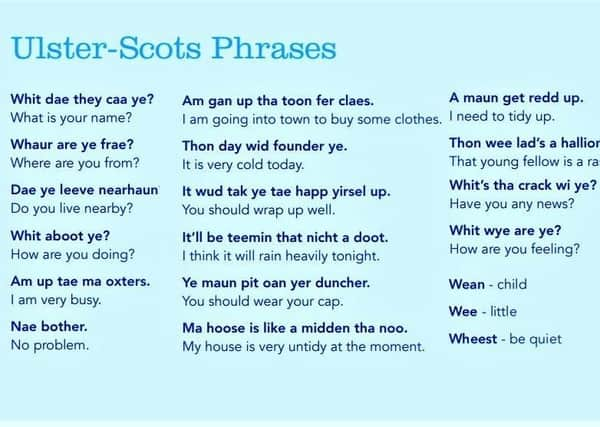Unionists have chance to bamboozle Sinn Fein by embracing an Irish language act


Tactically, Unionism can outflank Sinn Fein by fully embracing such an act. On first reading of the previous sentence, it might seem that someone like myself, who comes from an evangelical Presbyterian, Ulster Unionist, and loyal order family background, has jumped ship to Naomi Long’s Alliance Party rollercoaster.
However, Unionism needs to fully understand the new long war of republicanism in its bid to achieve a 32-county, all-Ireland, democratic socialist republic as demanded by the 1916 Easter Rising Proclamation.
Advertisement
Hide AdAdvertisement
Hide AdMainstream republicanism is no longer indulging in a violent terrorist campaign, but since the signing of the Good Friday Agreement in 1998, it is attempting to implement a cultural dismantling of Unionism.
First, it was the parades disputes under the excuse that nationalists now lived along the routes of traditional loyal order marches. This plan was intended to drive a wedge between the Unionist middle class and the loyal orders.
The culture-dismantling campaign was increased with targeting of traditional Eleventh Night loyalist bonfire locations.
But the real push against pro-Unionist culture in Northern Ireland has been republicanism’s blatant hijacking of the Irish language.
Advertisement
Hide AdAdvertisement
Hide AdInstead of attempting to retake or reclaim the Irish language from republicanism, Unionism attempted to enter the language battle by trying to develop Ulster-Scots as a minority European language.
However, for people like myself who grew up in rural County Antrim, Ulster-Scots is nothing more than a broad Ballymena accent!
At best, in my honest opinion, it is nothing more than a dialect, but not a separate language. No doubt, Ulster-Scots ‘linguists’ will be jumping down my throat at that suggestion.
It is equally abundantly clear that Unionism has been wrong-footed by republicanism over the Irish language, thereby convincing Unionism to ignore its rich heritage with that language.
Advertisement
Hide AdAdvertisement
Hide AdRepublicanism has already conveniently airbrushed out of history that it was radical Presbyterians who organised the United Irishmen’s rebellion of 1798.
Likewise, Unionism seems to have equally conveniently overlooked the very significant fact that it was Irish Presbyterians who saved the Irish language from total extinction.
It is rather amazing, too, that the Orange Order’s ruling body, the Grand Lodge of Ireland, has expressed opposition to an Irish Language Act when some Loyal Order banners proudly display the Irish language.
Given this rich Irish language heritage in the Loyal Orders and Unionism, how should they all react to a proposed Irish Language Act, even if Sinn Fein has made it one of republicanism’s red lines?
Advertisement
Hide AdAdvertisement
Hide AdThe solution is simple, yet practical. The Loyal Orders and Unionism should forget about trying to combat Sinn Fein with rebranding a ‘Ballymena accent’ (Ulster-Scots) as an alternative language.
The Loyal Orders and Unionism should embrace the Irish language and apply for every penny of funding available to set up Irish language classes. The only reason Sinn Fein has made such a fuss of the Irish language is because it taunts Unionism.
Sinn Fein would drop demands for an Irish Language Act like a hot potato if every Orange lodge, Royal Black preceptory and Apprentice Boys club applied for funding to launch Irish language classes in their halls. By adopting the Irish language, Unionism and the Loyal Orders would defuse the Sinn Fein cultural cannon.
Unionism and the Loyal Orders have played smart when it comes to St Patrick’s Day and the Battle of the Somme commemorations. St Patrick’s Day in the past was perceived to be a nationalist festival, but Orange lodges have also used it as a parade and many Unionist branches organise Irish stew social evenings.
Advertisement
Hide AdAdvertisement
Hide AdLikewise, both Unionism and the Loyal Orders have publicly acknowledged the role played by British regiments recruited overwhelmingly from Ireland’s nationalist community at the Somme, especially during the July 1st 1916 opening day.
In Orangeism, 1st July has become known as ‘The Mini Twelfth’, and Unionists need to break the mindset that only the 36th Ulster Division suffered terrible losses that day.
Perhaps the pro-Union community could also make a start in recognising the role of Protestant nationalists in Irish history and heritage.
– Dr John Coulter has been a journalist in Northern Ireland since 1978, including for the News Letter
More News Letter letters and opinion at this link.
——— ———
A message from the Editor:
Advertisement
Hide AdAdvertisement
Hide AdThank you for reading this story on our website. While I have your attention, I also have an important request to make of you.
With the coronavirus lockdowns having had a major impact on many of our advertisers — and consequently the revenue we receive — we are more reliant than ever on you taking out a digital subscription.
Subscribe to newsletter.co.ukand enjoy unlimited access to the best Northern Ireland and UK news and information online and on our app. With a digital subscription, you can read more than 5 articles, see fewer ads, enjoy faster load times, and get access to exclusive newsletters and content.
Visit https://www.newsletter.co.uk/subscriptionsnow to sign up
Advertisement
Hide AdAdvertisement
Hide AdOur journalism costs money and we rely on advertising, print and digital revenues to help to support them. By supporting us, we are able to support you in providing trusted, fact-checked content for this website.
Ben Lowry, Editor